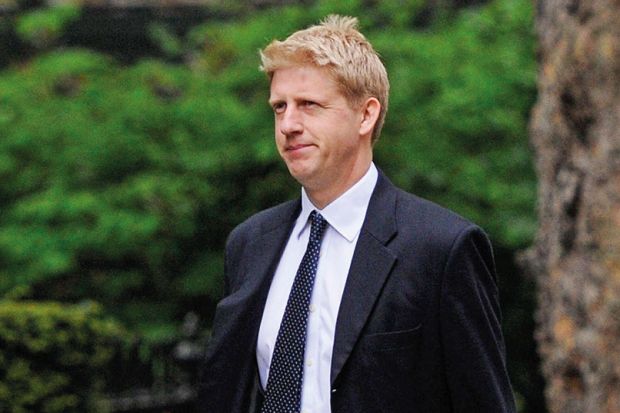The universities and science minister has said that the government does not intend to subject academics to new rules that critics feared would have stopped them from contributing to public debate.
Jo Johnson made the announcement on 19 April after criticism that new Cabinet Office rules, targeted at charities lobbying for legislative changes, would have prevented scholars from receiving public grants if they attempted to “influence” the government.
“I am happy to confirm that it is not our intention for the research councils, the Higher Education Funding Council for England (Hefce) or the National Academies to be covered by the clause. We are continuing to talk to the research community and will outline more detail by 1 May, when this clause takes effect,” he said in a statement.
The Campaign for Science and Engineering (Case), which has been discussing with the Department for Business, Innovation and Skills how to remove any threat to academic freedom of speech, said in a statement that the announcement was “good news and a huge step in the right direction”.
“Scientists felt embroiled in a debate about lobbying which did not appear to apply to them,” it said. “The science minister, Jo Johnson, and many across government have done a huge amount to make the case that it does not.”
However, Sarah Main, Case director, told Times Higher Education that other departments, aside from BIS, that funded research also needed to make sure that the same exemptions apply.
“If you’re a university administrator or researcher, you don’t want to have to be running through the different parts of the clause”, finding out which conditions applied to certain research projects, she said.
The Cabinet Office has not issued a specific exemption for universities, and instead it is thought that BIS will use a ministerial exemption to prevent universities from being caught up in the new rules.
Dr Main said that it was “very important” for this ministerial exemption “to be long lasting and robust”.
Bob Ward, the policy and communications director at the Grantham Research Institute on Climate Change and an opponent of the new rules, said in a statement that he was “very glad that the government has today announced its intention to create this exemption for university researchers”.
“I hope that the exemption will apply not just to grants from the higher education funding councils and research councils, but also to grants from government departments for research,” he added. “Without the exemption, the clause would forbid researchers from using government grants to attempt to influence policymaking.”
Register to continue
Why register?
- Registration is free and only takes a moment
- Once registered, you can read 3 articles a month
- Sign up for our newsletter
Subscribe
Or subscribe for unlimited access to:
- Unlimited access to news, views, insights & reviews
- Digital editions
- Digital access to THE’s university and college rankings analysis
Already registered or a current subscriber? Login





